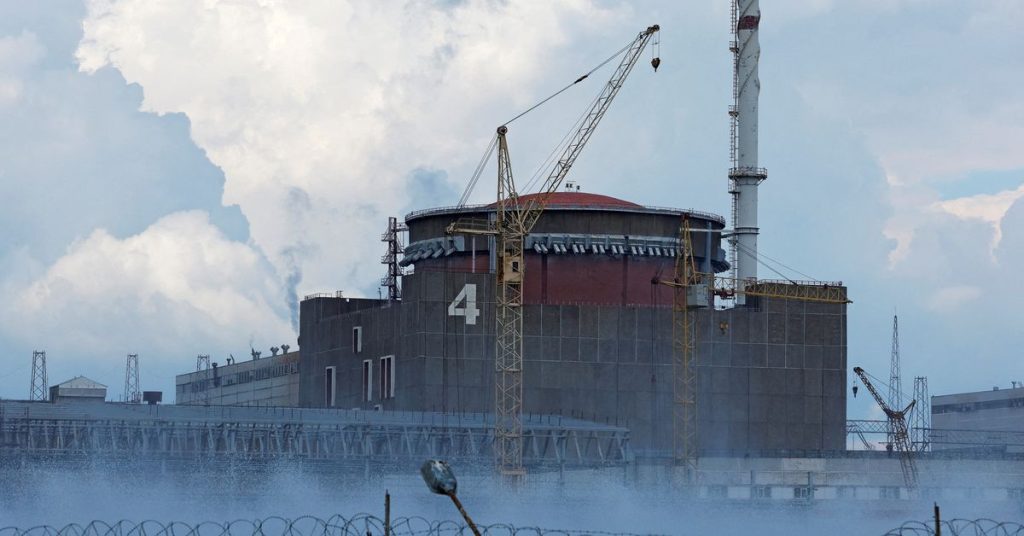
(Reuters) – United Nations Secretary-General Antonio Guterres called on Monday for international inspectors to be allowed into the Zaporizhzhya nuclear plant after Ukraine and Russia traded accusations over the bombing of Europe’s largest atomic station at the weekend.
“Any attack (on) a nuclear plant is suicidal,” Guterres told a news conference in Japan, where he attended a peace memorial ceremony in Hiroshima on Saturday.
Russian forces captured the Zaporizhzhia nuclear reactor complex in southeastern Ukraine in early March, shortly after Moscow invaded its neighbour, but it is still managed by Ukrainian technicians.
Register now to get free unlimited access to Reuters.com
Ukraine blamed Russia for the renewed bombing on Saturday that damaged three radiation sensors and injured a factory worker, the second in consecutive days at the site.
Ukrainian President Volodymyr Zelensky, in a televised address on Sunday, said Russia is waging “nuclear terrorism” that calls for more international sanctions, this time on Moscow’s nuclear sector.
The Russian authority in the region said that Ukrainian forces bombed the site with multiple rocket launchers, causing damage to administrative buildings and an area near a storage facility.
The Russian Embassy in Washington also identified the damage, saying that artillery fire from “Ukrainian nationalists” destroyed two high-voltage power lines and a water pipeline, but that vital infrastructure was not affected.
Reuters was unable to verify either side’s account of what happened.
The events at the Zaporizhzhia site – where Kyiv alleged that Russia hit a power line on Friday – alarmed the world.
Guterres said the IAEA needed access to the station. “We fully support the IAEA in all its efforts in terms of creating conditions for stabilization of the plant,” he said.
The Director-General of the International Atomic Energy Agency, Rafael Mariano Grossi, warned on Saturday that the latest attack “underscores the real danger of a nuclear catastrophe.”
Grain exports pick up steam
Elsewhere, an agreement to unblock Ukrainian food exports and ease global shortages accelerated, as two grain ships sailed from Ukraine’s Black Sea ports on Monday, bringing the total to 12 since the first ship left a week ago. Read more
The Turkish Defense Ministry said four ships that left Ukraine on Sunday are expected to dock near Istanbul on Monday evening, and will be inspected on Tuesday, while the first ship to set sail since the Russian invasion on Feb. 24 docked.
The last two departing ships were carrying nearly 59,000 tons of corn and soybeans and were bound for Italy and southeastern Turkey after inspections. The four that departed on Sunday carried nearly 170,000 tons of corn and other foodstuffs.
The July 22 grain export deal brokered by Turkey and the United Nations marks a rare diplomatic victory as fighting continues in Ukraine and is intended to help ease the war-induced rise in global food prices.
Before the conquest of Moscow, Russia and Ukraine together accounted for nearly a third of global wheat exports. The turmoil that has occurred since then has raised the specter of famine in parts of the world.
Grind battle for Donbass
Russia says it is conducting a “special military operation” in Ukraine to rid it of nationalists and protect Russian-speaking communities. Ukraine and the West describe Russia’s actions as an unjustified imperial-style war to re-establish control over a pro-Western neighbor lost when the Soviet Union disintegrated in 1991.
The conflict has displaced millions, killed thousands of civilians, and left cities, towns and villages in ruins.
It developed into a war of attrition concentrated in eastern and southeastern Ukraine.
Russian President Vladimir Putin’s forces are trying to take full control of Ukraine’s eastern Donbas region, where pro-Moscow separatists seized territory after the Kremlin annexed Crimea to the south in 2014.
“Ukrainian soldiers firmly maintain the defense, inflict losses on the enemy and are ready for any changes in the operational situation,” the Ukrainian General Staff said in an operational update on Monday.
The Ukrainian military said that Russian forces intensified their attacks north and northwest of the Russian-controlled city of Donetsk in Donbass on Sunday. She said that the Russians attacked Ukrainian positions near the heavily fortified settlements of Pesky and Avdiivka, as well as bombed other positions in the Donetsk province.
Kyiv said that in addition to tightening its grip on Donbass, Russia is consolidating its position in southern Ukraine, where it has amassed its forces in an attempt to prevent a potential counterattack near Kherson.
The Interfax news agency quoted a Russian-appointed official in the southeastern city of Kherson as saying on Monday that Ukrainian forces had again bombed the Antonevsky Bridge there, damaging construction equipment and delaying its reopening.
The bridge is one of only two crossing points for Russian troops into the lands they captured on the west bank of the main Dnipro River in the south.
It has been a major Ukrainian target in recent weeks, with Kyiv using high-precision missiles provided by the United States to try to destroy it in preparation for a counterattack.
Register now to get free unlimited access to Reuters.com
Reporting by Reuters offices. Written by Stephen Coates and Mark Heinrich; Editing by Simon Cameron Moore and Nick McPhee
Our criteria: Thomson Reuters Trust Principles.

“Travel specialist. Typical social media scholar. Friend of animals everywhere. Freelance zombie ninja. Twitter buff.”





More Stories
Macron rejects left-wing bid to appoint PM before Olympics
Dogs can smell human stress and make decisions accordingly, study says: NPR
Hamas and Fatah sign declaration to form future government as war rages in Gaza